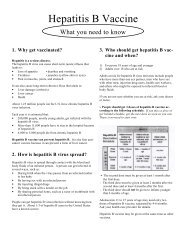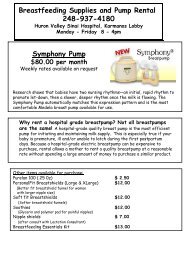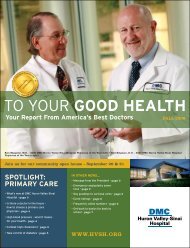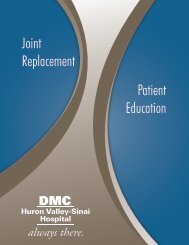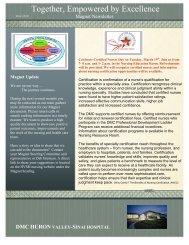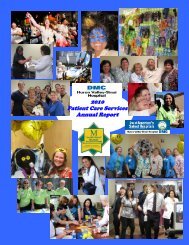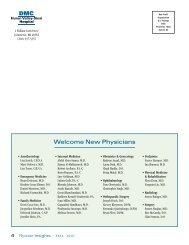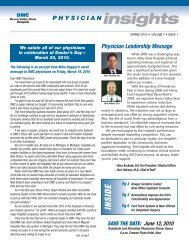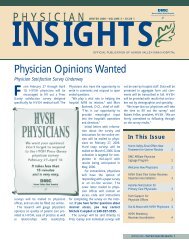TO YOUR GOOD HEALTH - Huron Valley-Sinai Hospital
TO YOUR GOOD HEALTH - Huron Valley-Sinai Hospital
TO YOUR GOOD HEALTH - Huron Valley-Sinai Hospital
- No tags were found...
You also want an ePaper? Increase the reach of your titles
YUMPU automatically turns print PDFs into web optimized ePapers that Google loves.
FOR A REFERRAL, CALL 1-888-DMC-2500 • DMC HURON VALLEY-SINAI HOSPITALWHAT IS PERIPHERALARTERY DISEASE?Most of us know that clogged arteries in the heart canlead to a heart attack. While the signs do not show up assuddenly, blocked arteries in the legs can also causeserious health problems.This condition, known as Peripheral Artery Disease or PAD,is caused by fatty deposits called plaque building up in theblood vessels. Blood flow is limited, which reduces oxygento the muscles.What are the risk factors?Many of the same risk factors you may have heard of forheart disease are also risk factors for PAD. You may be atincreased risk for PAD if you:• are a diabetic• are a smoker or used tosmoke• have a history of highblood pressure• have a family historyof or have had heartdisease or a stroke• are over age 50• are overweight• have abnormalcholesterol levels<strong>Huron</strong> <strong>Valley</strong>-<strong>Sinai</strong> <strong>Hospital</strong> has established a PAD Clinic todiagnose and treat this serious disease. The PAD Clinicemphasizes the use of the least-invasive treatment possible.Call for more information or an appointment:The Vascular Clinic at <strong>Huron</strong> <strong>Valley</strong>-<strong>Sinai</strong> <strong>Hospital</strong>Phone number: (248) 937-3467Hours: Wednesday 8:00 a.m. – 12:00 p.m.RISK FAC<strong>TO</strong>RS ANDHEART DISEASEAbdul R. Halabi, M.D.Interventional CardiologistWhile many people take their health for granted, it is important to understandthe factors that could put you at risk for cardiovascular disease. Takingpreventative steps now will help ensure you lead a healthy and happy life.There are major risk factors that cannot be changed. Increased age,heredity and your gender all play a role in the likelihood that you may developcardiovascular disease. The good news is that there are lifestyle modificationsyou can make to drastically decrease your risk.Stop smoking: Smokers’ risk of dying from coronary heart disease is 2–3 timesthat of nonsmokers. Exposure to other people’s smoke increases the risk of heartdisease even for nonsmokers.Control high blood cholesterol: A low-fat, low-cholesterol diet can go a long wayin improving your lipid profile. Being aware of your caloric and fat intake,including vegetable, fruit, and fish in your diet are necessary steps that youshould take.Control high blood pressure: High blood pressure increases the heart’s workload,causing the heart to thicken, become stiffer, and possibly fail in advanced stages.Be physically active: Regular moderate-to-vigorous physical activity helps preventheart and blood vessel disease.Control your weight: People who have excess body fat — especially in the waistarea — are more likely to develop heart disease and stroke, even if they have noother risk factors. Excess weight does increase the heart’s workload.Control your diabetes: Even when glucose levels are under control,diabetes increases the risks of heart disease and stroke, but the risks remaingreater if blood sugar levels are not well controlled.LDL APHERESIS - WHEN DRUGS CAN’T CONTROL CHOLESTEROLWhat do you do if you have tried every cholesterol-lowering drug yourbody can tolerate, you follow a strict diet and exercise program, butyour cholesterol is still high?through a different vein, the plasma is run through another part ofthe machine that removes the LDL in the plasma. Thus, the blood is“cleaned” of the bad cholesterol.LDL refers to what is known as the “bad” cholesterol. The LDLapheresis procedure is performed by removing blood through an IV inone arm and filtering it through a machine that separates out theplasma. While the rest of the blood is passed back to the patientLDL apheresis is not for everyone. It is approved for use in peoplewhose cholesterol is over 200 mb/dL and cannot be controlled withprescription drugs. For more information, please call (248) 937-5076.5



